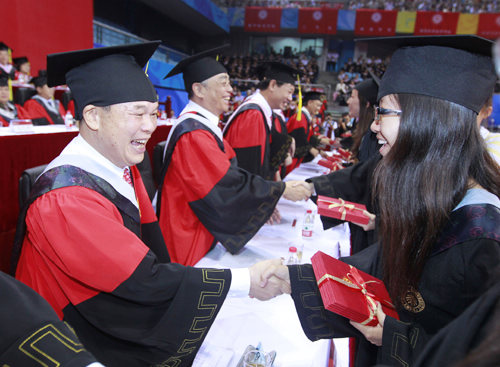|
 |
|
STUDENTS HONORED: Peking University President Zhou Qifeng awards a diploma to a student at the commencement event on July 5, 2011 (REN ZHENGLAI) |
On February 20, Chen Jining was appointed president of China's prestigious Tsinghua University in Beijing. Chen is one of a number of new presidents appointed to leading Chinese universities over the past few years.
The new round of appointments to key positions at universities began in 2006. By February this year, 28 universities listed in China's Project 985 for higher education development and 79 universities covered by the earlier Project 211 had new presidents. In 2011 alone, 10 universities included in the elite Project 985 group had new presidents appointed.
The appointment of new university presidents took place against the backdrop of China's concerted efforts to establish world-class universities.
"A new president will always bring about fresh changes to a university and is seen as a main driver of a university's development," said Cheng Fangping, a professor at the Education School of the Renmin University of China in Beijing.
As the pinnacle of China's higher education system, those universities associated with Project 211 and 985 have an urgent responsibility to build themselves into world-class universities.
Project 211, initiated in 1993, is a government endeavor to develop about 100 Chinese institutions of higher education into world-class centers of learning. The figure of 21 and 1 within the name 211 are from the abbreviation of the 21st century and approximately 100 universities.
The motivation for the project was the fact that in the 1990s, the country's 30 elite universities were not maintaining sufficiently high research standards and were therefore poorly regarded internationally. The Chinese Government aimed to cultivate 100 high-level universities to enable the country to implement national economic and social development strategies.
Universities that fall under the scope of Project 211, which totaled 112 at the end of 2011, train 80 percent of the country's doctoral students, two thirds of its graduate students, half the international students and a third of undergraduates.
In the first three phases of Project 211 between 1995 and 2011, the Central Government invested 17.7 billion yuan ($2.81 billion) in the project.
In 1998, China further concentrated its efforts to create elite universities by launching Project 985, named after the date it was launched on May 5, 1998. This project provided extra funding to 10 universities, and it has now expanded to cover 39 higher learning institutions.
The project aims at creating a core set of universities that can compete effectively in the global arena.
The project was initiated by former Chinese President Jiang Zemin, who said at Peking University's centenary ceremony on May 4, 1998, that "China must have a number of top-class universities at the international level."
Earlier, former Premier Zhu Rongji said in March 1998 that revitalizing the nation through science and education was the biggest task of his government.
With so much attention focused on higher education, Peking University, following the model of the Knowledge Innovation Program launched by the Chinese Academy of Sciences (CAS), made a policy appeal to the Central Government, in order to receive more support for its future development.
The CAS Knowledge Innovation Program was authorized by the Central Government in February 1998 and received a total of 4.80 billion yuan ($762 million) from the state coffer to support its pilot projects.
"Compared to Project 211, the Knowledge Innovation Program has more centralized objectives with higher construction targets and more funds, which directly inspired and promoted the planning and the establishment of Project 985," said Chen Xuefei, a professor at the Graduate School of Education of Peking University.
| 